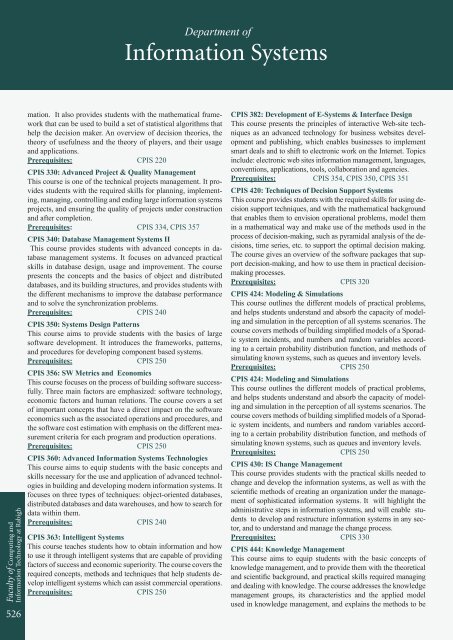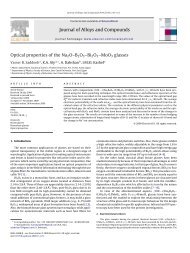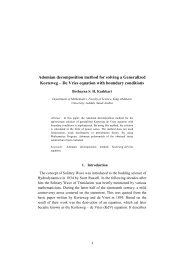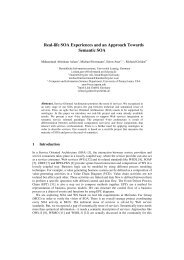Faculty of
Faculty of
Faculty of
You also want an ePaper? Increase the reach of your titles
YUMPU automatically turns print PDFs into web optimized ePapers that Google loves.
Department <strong>of</strong><br />
Information Systems<br />
<strong>Faculty</strong> <strong>of</strong> Computing and<br />
Information Technology at Rabigh<br />
526<br />
mation. It also provides students with the mathematical framework<br />
that can be used to build a set <strong>of</strong> statistical algorithms that<br />
help the decision maker. An overview <strong>of</strong> decision theories, the<br />
theory <strong>of</strong> usefulness and the theory <strong>of</strong> players, and their usage<br />
and applications.<br />
Prerequisites: CPIS 220<br />
CPIS 330: Advanced Project & Quality Management<br />
This course is one <strong>of</strong> the technical projects management. It provides<br />
students with the required skills for planning, implementing,<br />
managing, controlling and ending large information systems<br />
projects, and ensuring the quality <strong>of</strong> projects under construction<br />
and after completion.<br />
Prerequisites: CPIS 334, CPIS 357<br />
CPIS 340: Database Management Systems II<br />
This course provides students with advanced concepts in database<br />
management systems. It focuses on advanced practical<br />
skills in database design, usage and improvement. The course<br />
presents the concepts and the basics <strong>of</strong> object and distributed<br />
databases, and its building structures, and provides students with<br />
the different mechanisms to improve the database performance<br />
and to solve the synchronization problems.<br />
Prerequisites: CPIS 240<br />
CPIS 350: Systems Design Patterns<br />
This course aims to provide students with the basics <strong>of</strong> large<br />
s<strong>of</strong>tware development. It introduces the frameworks, patterns,<br />
and procedures for developing component based systems.<br />
Prerequisites: CPIS 250<br />
CPIS 356: SW Metrics and Economics<br />
This course focuses on the process <strong>of</strong> building s<strong>of</strong>tware successfully.<br />
Three main factors are emphasized: s<strong>of</strong>tware technology,<br />
economic factors and human relations. The course covers a set<br />
<strong>of</strong> important concepts that have a direct impact on the s<strong>of</strong>tware<br />
economics such as the associated operations and procedures, and<br />
the s<strong>of</strong>tware cost estimation with emphasis on the different measurement<br />
criteria for each program and production operations.<br />
Prerequisites: CPIS 250<br />
CPIS 360: Advanced Information Systems Technologies<br />
This course aims to equip students with the basic concepts and<br />
skills necessary for the use and application <strong>of</strong> advanced technologies<br />
in building and developing modern information systems. It<br />
focuses on three types <strong>of</strong> techniques: object-oriented databases,<br />
distributed databases and data warehouses, and how to search for<br />
data within them.<br />
Prerequisites: CPIS 240<br />
CPIS 363: Intelligent Systems<br />
This course teaches students how to obtain information and how<br />
to use it through intelligent systems that are capable <strong>of</strong> providing<br />
factors <strong>of</strong> success and economic superiority. The course covers the<br />
required concepts, methods and techniques that help students develop<br />
intelligent systems which can assist commercial operations.<br />
Prerequisites: CPIS 250<br />
CPIS 382: Development <strong>of</strong> E-Systems & Interface Design<br />
This course presents the principles <strong>of</strong> interactive Web-site techniques<br />
as an advanced technology for business websites development<br />
and publishing, which enables businesses to implement<br />
smart deals and to shift to electronic work on the Internet. Topics<br />
include: electronic web sites information management, languages,<br />
conventions, applications, tools, collaboration and agencies.<br />
Prerequisites: CPIS 354, CPIS 350, CPIS 351<br />
CPIS 420: Techniques <strong>of</strong> Decision Support Systems<br />
This course provides students with the required skills for using decision<br />
support techniques, and with the mathematical background<br />
that enables them to envision operational problems, model them<br />
in a mathematical way and make use <strong>of</strong> the methods used in the<br />
process <strong>of</strong> decision-making, such as pyramidal analysis <strong>of</strong> the decisions,<br />
time series, etc. to support the optimal decision making.<br />
The course gives an overview <strong>of</strong> the s<strong>of</strong>tware packages that support<br />
decision-making, and how to use them in practical decisionmaking<br />
processes.<br />
Prerequisites: CPIS 320<br />
CPIS 424: Modeling & Simulations<br />
This course outlines the different models <strong>of</strong> practical problems,<br />
and helps students understand and absorb the capacity <strong>of</strong> modeling<br />
and simulation in the perception <strong>of</strong> all systems scenarios. The<br />
course covers methods <strong>of</strong> building simplified models <strong>of</strong> a Sporadic<br />
system incidents, and numbers and random variables according<br />
to a certain probability distribution function, and methods <strong>of</strong><br />
simulating known systems, such as queues and inventory levels.<br />
Prerequisites: CPIS 250<br />
CPIS 424: Modeling and Simulations<br />
This course outlines the different models <strong>of</strong> practical problems,<br />
and helps students understand and absorb the capacity <strong>of</strong> modeling<br />
and simulation in the perception <strong>of</strong> all systems scenarios. The<br />
course covers methods <strong>of</strong> building simplified models <strong>of</strong> a Sporadic<br />
system incidents, and numbers and random variables according<br />
to a certain probability distribution function, and methods <strong>of</strong><br />
simulating known systems, such as queues and inventory levels.<br />
Prerequisites: CPIS 250<br />
CPIS 430: IS Change Management<br />
This course provides students with the practical skills needed to<br />
change and develop the information systems, as well as with the<br />
scientific methods <strong>of</strong> creating an organization under the management<br />
<strong>of</strong> sophisticated information systems. It will highlight the<br />
administrative steps in information systems, and will enable students<br />
to develop and restructure information systems in any sector,<br />
and to understand and manage the change process.<br />
Prerequisites: CPIS 330<br />
CPIS 444: Knowledge Management<br />
This course aims to equip students with the basic concepts <strong>of</strong><br />
knowledge management, and to provide them with the theoretical<br />
and scientific background, and practical skills required managing<br />
and dealing with knowledge. The course addresses the knowledge<br />
management groups, its characteristics and the applied model<br />
used in knowledge management, and explains the methods to be<br />
18) Chapter Rabigh CIT.indd 526 8/21/10 12:18 PM

















